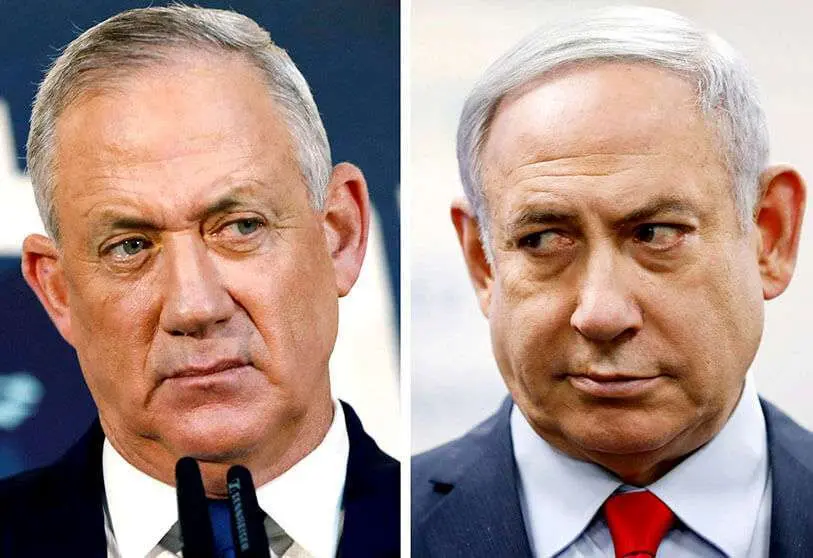An emergency government for Netanyahu

A popular proverb says that if you can't defeat your enemies, join them. Israeli Prime Minister Benyamin Netanyahu has readjusted this proverb so that, unable to defeat his political opponents in three consecutive elections, he has forced them to join him and his emergency government at the height of the coronavirus pandemic.
On Monday, April 20, Netanyahu reached an agreement with Benny Gantz, who was his biggest obstacle to becoming Prime Minister, after several weeks of negotiations between Likud, Netanyahu's party, and Blue & White, the Gantz-led coalition. Gantz eventually gave in despite his active and passive refusal to rule with Netanyahu in the past. According to Blue & White's calculations, entering into an emergency government to deal with the crisis caused by the coronavirus is a minor inconvenience compared to a fourth election that, according to the polls, would have given Netanyahu a much larger majority than the current one. Some voices on the right and ultra-right in Israel, which has ruled with Netanyahu's Likud since 2015, have been critical towards the Prime Minister, considering that he has given up some of the most radical positions in order to reach a compromise with the centrist Blue & White. However, it seems that Netanyahu has been the winner of the pact with Gantz.
The coalition government signed by Blue & White and Likud gives the ministries of defense and foreign affairs to Gantz's party, probably the two most important in the country. Blue & White will also control the Ministry of Justice. This detail has been celebrated by those concerned about the state of Israeli democracy, as it would prevent Netanyahu, who is accused of three cases of corruption, from controlling Israeli justice. Of course, Blue & White has been determined to show this as a small victory that safeguards the rule of law.
However, the agreement provides that the Judicial Appointments Committee, the political entity that selects judges in Israel, will be controlled by Zvi Hauser, a member of the Knesset (the Israeli Parliament) who, although he is not part of Likud, advocated the grand coalition between Netanyahu and Gantz from the beginning, even when the latter rejected it. The composition of the Judicial Appointments Committee had been the point at which negotiations between the two parties were blocked, and in the end, Netanyahu got his way: this ensures that this committee is in the hands of an ally of his. Netanyahu's trial is scheduled to begin in May and is likely to last two years or even longer. Therefore, controlling the committee that appoints judges who may in the future hold the Prime Minister's fate in their hands proved to be a crucial necessity for Netanyahu.
Yair Lapid, an ex-Gantz ally, explained on Twitter that, by giving Netanyahu the power to control the Judicial Appointments Committee, Gantz has "agreed to allow the defendant himself to select the judges who will decide his affairs". Although the future coalition government has given as many ministries to Blue & White as to Likud (17 each, making it the largest government in the history of Israel), Netanyahu has seen his main demand for the Judicial Appointments Committee fulfilled.
But in the coming months it' possible that Netanyahu will gain even more of an advantage in his struggle with Gantz to dominate the government. By forcing Gantz to join him, he has caused the only party that could present itself as a government alternative to him to fragment: of the 33 deputies that Blue & White had, 15 will support the new coalition government, but the rest will remain in opposition, led by Yair Lapid. With such a decimated opposition it is clear that it will be difficult to lead an alternative to Netanyahu.
It remains to be seen what role will be played by the small right-wing and ultra-right-wing parties that in principle will not support Netanyahu, of whom they were partners until just two months ago. Although they will surely accuse Netanyahu of having conceded to some of the demands of the Israeli right, the pact with Gantz contains the most important of these claims: the annexation of a large part of the Palestinian Territories in the West Bank (or, for the Jews, the biblical regions of Judea and Samaria). The Gantz-Netanyahu pact therefore provides that from July 1st the State of Israel can begin the annexation in accordance with the Century Pact negotiated with the government of Donald Trump.
Finally, it should be noted that Netanyahu has succeeded in uniting not only the centrist coalition of Benny Gantz, but also some deputies of the left-wing Labour-Gesher-Meretz Party, to his cause. Months ago, it seemed impossible for someone from a secular, progressive party to enter a government led by Netanyahu, which once again demonstrates the Prime Minister's ability to transform an obstacle into an electoral gain.
There is not even a guarantee that this emergency government will end the term, especially given the enormous fragmentation of the Knesset and the divergences that will exist within the government. But what is clear is that Netanyahu has readjusted his strategy, looking this time to his left rather than to his right. By doing so, he has ensured that he forms a government at a critical time for Israel, thanks to which he will continue to be prime minister and thus remain protected by a shield of immunity from judicial investigations.

